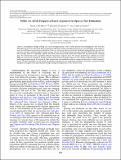Files in this item
PoMo : an allele frequency-based approach for species tree estimation
Item metadata
| dc.contributor.author | De Maio, Nicola | |
| dc.contributor.author | Schrempf, Dominik | |
| dc.contributor.author | Kosiol, Carolin | |
| dc.date.accessioned | 2017-02-09T13:30:19Z | |
| dc.date.available | 2017-02-09T13:30:19Z | |
| dc.date.issued | 2015-11 | |
| dc.identifier | 249098610 | |
| dc.identifier | 299eb682-af44-4826-aacf-153a43a2127f | |
| dc.identifier | 26209413 | |
| dc.identifier | 84946105401 | |
| dc.identifier.citation | De Maio , N , Schrempf , D & Kosiol , C 2015 , ' PoMo : an allele frequency-based approach for species tree estimation ' , Systematic Biology , vol. 64 , no. 6 , pp. 1018-1031 . https://doi.org/10.1093/sysbio/syv048 | en |
| dc.identifier.issn | 1063-5157 | |
| dc.identifier.other | PubMedCentral: PMC4604832 | |
| dc.identifier.uri | https://hdl.handle.net/10023/10257 | |
| dc.description | This work was supported by a grant from the Austrian Science Fund (FWF, P24551-B25 to C.K.). N.D.M. and D.S. were members of the Vienna Graduate School of Population Genetics which is supported by a grant of the Austrian Science Fund (FWF, W1225-B20). N.D.M. was partially supported by the Institute for Emerging Infections, funded by the Oxford Martin School. | en |
| dc.description.abstract | Incomplete lineage sorting can cause incongruencies of the overall species-level phylogenetic tree with the phylogenetic trees for individual genes or genomic segments. If these incongruencies are not accounted for, it is possible to incur several biases in species tree estimation. Here, we present a simple maximum likelihood approach that accounts for ancestral variation and incomplete lineage sorting. We use a POlymorphisms-aware phylogenetic MOdel (PoMo) that we have recently shown to efficiently estimate mutation rates and fixation biases from within and between-species variation data. We extend this model to perform efficient estimation of species trees. We test the performance of PoMo in several different scenarios of incomplete lineage sorting using simulations and compare it with existing methods both in accuracy and computational speed. In contrast to other approaches, our model does not use coalescent theory but is allele frequency based. We show that PoMo is well suited for genome-wide species tree estimation and that on such data it is more accurate than previous approaches. | |
| dc.format.extent | 14 | |
| dc.format.extent | 740126 | |
| dc.language.iso | eng | |
| dc.relation.ispartof | Systematic Biology | en |
| dc.subject | Incomplete lineage sorting | en |
| dc.subject | Phylogenetics | en |
| dc.subject | PoMo | en |
| dc.subject | Species tree | en |
| dc.subject | QH301 Biology | en |
| dc.subject | QH426 Genetics | en |
| dc.subject | BDC | en |
| dc.subject | R2C | en |
| dc.subject.lcc | QH301 | en |
| dc.subject.lcc | QH426 | en |
| dc.title | PoMo : an allele frequency-based approach for species tree estimation | en |
| dc.type | Journal article | en |
| dc.contributor.institution | University of St Andrews. School of Biology | en |
| dc.contributor.institution | University of St Andrews. Centre for Biological Diversity | en |
| dc.identifier.doi | https://doi.org/10.1093/sysbio/syv048 | |
| dc.description.status | Peer reviewed | en |
This item appears in the following Collection(s)
Items in the St Andrews Research Repository are protected by copyright, with all rights reserved, unless otherwise indicated.

